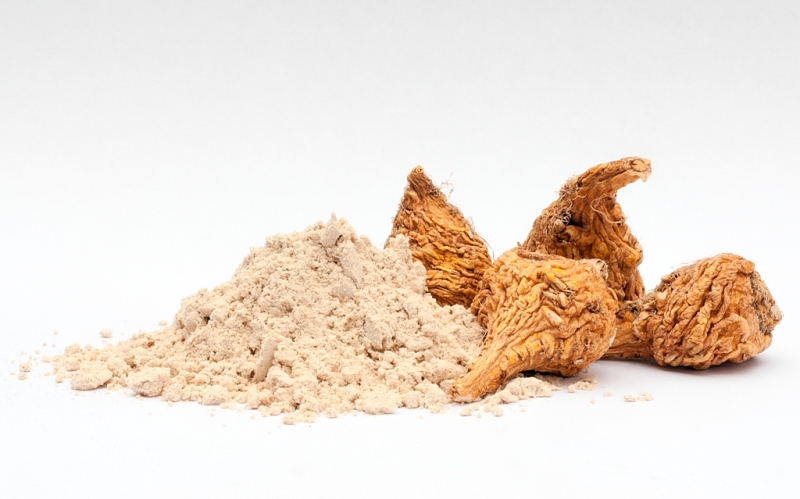Maca (Lepidium meyenii) is a plant that grows above 12,000 feet in altitude in the Andes Mountains of central Peru. There are three different varieties defined by the color of the root. Below is a collection of studies on the different Maca varieties’ effects on sexual function, sperm production, female reproductive function, memory, depression, anxiety, energy, benign prostatic hyperplasia, osteoporosis and metabolic syndrome.
In short, black Maca shows the best results on spermatogenesis, memory and fatigue, while red Maca is most effective in reversing benign prostatic hyperplasia and experimentally induced osteoporosis. All varieties have been shown to reduce glucose levels. While many experimental studies have shown that Maca has many benefits, more clinical studies are needed to confirm these results.
Below is a collection of clinical studies with their summaries or conclusions as published by the National Institute of Health.
Benefits of Maca on sexual dysfunction in postmenopausal women (2008)
CONCLUSION: Preliminary findings show that Lepidium meyenii (Maca) (3.5 g/d) reduces psychological symptoms, including anxiety and depression, and lowers measures of sexual dysfunction in postmenopausal women independent of estrogenic and androgenic activity.
Effect of Maca on Semen Parameters and Serum Hormone Levels in Healthy Adult Men (2015)
CONCLUSION: Our results indicate that maca possesses fertility enhancing properties in men. As long as men prefer to use alimentary supplement to enhance fertility rather than prescribed medication or any medical intervention, it is worth continuing to assess its possible benefits.
Neuroprotective effects of Maca (2010)
SUMMARY: The neuroprotective activity of Maca was studied in two experimental models … Crayfish neurons were pretreated with vehicle or the pentane extract from Maca … The pentane extract was then administered intravenously to rats prior to and following middle cerebral artery occlusion. While infarct volumes were decreased for the lower dose, higher doses increased infarct volumes compared to controls. These results suggest a potential application of Maca as a neuroprotectant.
Maca for treatment of menopausal symptoms (2011)
SUMMARY: The aim of this review was to assess the evidence for and against the effectiveness of the maca plant as a treatment for menopausal symptoms. We searched 17 databases [for] all randomized clinical trials (RCTs) [featuring] maca-based intervention [for] the treatment of menopausal symptoms. All studies were assessed for methodological quality using the Cochrane “risk of bias” assessment tool … These RCTs tested the effects of maca on menopausal symptoms in healthy perimenopausal, early postmenopausal, and late postmenopausal women. Using the Kupperman Menopausal Index and the Greene Climacteric Score, all RCTs demonstrated favorable effects of maca. There have been very few rigorous trials of maca for menopausal symptoms. The results of our systematic review provide limited evidence for the effectiveness of maca as a treatment for menopausal symptoms. However, the total number of trials, the total sample size, and the average methodological quality of the primary studies, were too limited to draw firm conclusions …
Effect of Maca on sexual desire and testosterone levels in adult healthy men (2002)
SUMMARY: Twelve-week, double-blind, placebo-controlled, randomized, parallel trial aimed to demonstrate if effect of gelatinized Maca on subjective report of sexual desire was because of effect on mood or serum testosterone levels. An improvement in sexual desire was observed with Maca after 8 weeks of treatment. Serum testosterone and oestradiol levels were not different in men treated with Maca and in those treated with placebo … In conclusion, treatment with Maca improved sexual desire.
Lepidium meyenii (Maca) improved semen parameters in adult men (2001)
CONCLUSION: Maca improved sperm production and sperm motility by mechanisms not related to testosterone.
Effect of Maca on spermatogenesis of male rats (2001)
CONCLUSION: The Maca root invigorates spermatogenesis in male rats by acting on its initial stages (IX-XIV).
Effect of black Maca sperm production in rats (2006)
SUMMARY: The present study tested the hypothesis that black Maca has early effects during a spermatogenic cycle (12 days) of male rats. For this, testicular spermatid, epididymal sperm and vas deferens sperm counts were measured after 1, 3, 5, 7 and 12 days of treatment with black Maca … Testicular testosterone was not affected after 7 days treatment with Black maca. In conclusion, Black maca affects sperm count as early as 1 day after beginning of treatment.
Effects of Maca on sexual performance in patients with mild erectile dysfunction (2009)
SUMMARY: We carried out a double-blind clinical trial on 50 Caucasian men affected by mild erectile dysfunction (ED), randomised to treatment with Maca dry extract, 2400 mg, or placebo. In conclusion, our data support a small but significant effect of Maca supplementation on subjective perception of general and sexual well-being in adult patients with mild ED.
Effect of Maca on sperm production in rats exposed to high altitude (2004)
SUMMARY: Study aimed to test the hypothesis that Maca can prevent high altitude-induced testicular disturbances. In conclusion, treatment of rats with Maca at high altitude prevented high altitude-induced spermatogenic disruption.
Role of Maca consumption on health status in populations living over 13,000-feet altitude (2013)
SUMMARY: Study aimed to determine the health status based on a health-related quality-of-life (HRQL) questionnaire (SF-20) and serum levels of interleukin 6 (IL-6) in subjects that are Maca consumers. A greater proportion of Maca consumers successfully completed the SUCSD test compared to non-consumers, consumption of Maca was associated with low serum IL-6 levels and in turn with better health status scores in the SF-20 survey and lower chronic mountain-sickness scores.
Effect of Maca on serum reproductive hormone levels in adult healthy men (2003)
SUMMARY: The study aimed to test the hypothesis that gelatinized Maca has no effect on serum reproductive hormone levels in apparently healthy men when administered in doses used for aphrodisiac and/or fertility-enhancing properties. Data showed that treatment with Maca does not affect serum reproductive hormone levels.
Antiviral activity of Maca (Lepidium meyenii) against human influenza virus (2014)
CONCLUSION: In vitro assays demonstrated that maca has antiviral activity not only against Flu-A (like most antiviral agents) but also Flu-B viruses, providing remarkable therapeutic benefits.
Maca reduces spermatogenic damage induced by malathion in mice (2005)
CONCLUSION: Maca enhances spermatogenesis following spermatogenic damage caused by the organophosphorous pesticide.
Lepidium meyenii (Maca) increases litter size in normal adult female mice (2005)
CONCLUSION: Administration of yellow Maca extract to adult female mice increases the litter size. Moreover, this treatment increases the uterine weight in ovariectomized animals. Our study confirms for the first time some of the traditional uses of Maca to enhance female fertility.
Red maca reduced prostate size in rats (2005)
Red Maca, a cruciferous plant from the highland of Peru, reduced ventral prostate size in normal and TE treated rats.


